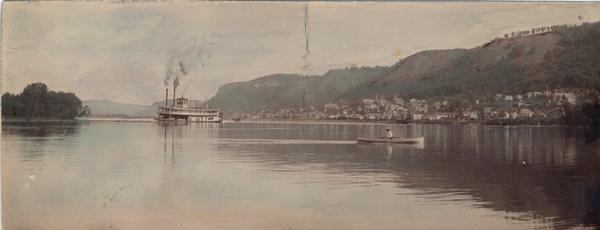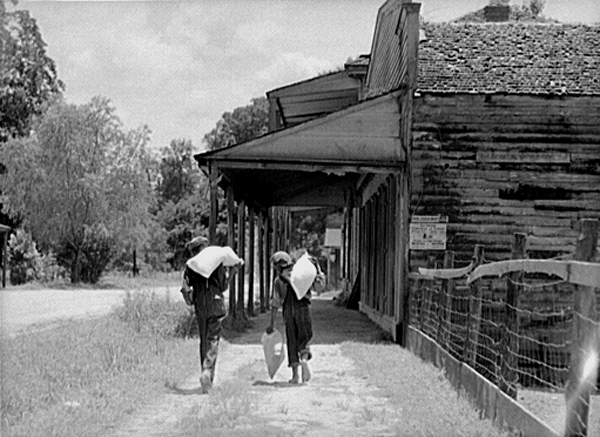Young Town - Chickasaw initially settled the area, the French intermingled with them and established a village until the Indian Removals of 1830. As the federal government swept indigenous peoples aside, the Chickasaw quietly slipped across the river to Battiste Parrish. Afterwards Anglo settlers moved into the area and the settlement grew.
A reporter described the "brave little city" as the "heart of navigation up and down the tributaries feeding into Old Man River," the muddy water bearing hundreds of bales of cotton by keel boat.
The first settlers were the Tagerts, Golds, Conerlys, Harmans, and Parcells.
The Golds owned a boat company, shipped cotton and other freight downstream to New Orleans.
There was a post office, a dry goods store, and a pottry that made bowls, churns, and plates. The first church was at "The Old Burnt Meetin' House Place", struck by lightning and burned to the ground in 1847. Young Town also has a camp ground and a Methodist church. Tumbleson County was organized in 1855, and the first courts and meetings of the Board were held at Young Town. Since then, the town has been the heart of Tumbleson County's economic and political landscape.
Unincorporated Townships
Odem Railroad Station - An unincorporated township in Tumbleson County, the mail coming into the area starts here. Built up around the Black River Rail Company station, the town's other notable feature is Odem's. A roadhouse specializing in sausage of all sorts.
Burning Bush - Bearing the dubious honor of being the Rambler's hometown, Burning Bush is a god-fearing town home to three Baptist churches. The second largest settlement besides Young Town, the town's population provides labor for the surrounding farms, mostly cotton and tobacco.
Mockingbird - A lumber town and the site of the 2nd courthouse built in Tumbleson County. The first courthouse was in the ghost town of Questing. Sitting on the Pascaloosa River, much of the lumber is ran down the river current to Young Town.
Blackwell - Founded as a gator hunting camp and river fortification housing the U.S. interpreter for the Chickasaw Agency to communicate with the Chickasaw Nation. Unfortunately, the low-lying site of the town is prone to flooding and the Indian Removal of 1830 robbed it of purpose. Since then the settlement has largely been abandoned and populated by squatters.
Sunflower - Deeper in the woods from Odem, Sunflower is home to the first electric saw mill in the region kick starting a lumber boom. Now the town is growing at a rapid rate and experiencing growing pains. Once just a dry goods store and a hotel, a large tent city has since popped up.
Jug's Corner -This moonshiners' settlement has been invaded by the Fergusons who've come down from Black Rock, West Virginia. They have muscled their way into the manufacture and distribution of moonshine, a match to the powder keg of backwood feuds.
Ghost Towns
Bloodland - Once the nest of vice and iniquity, a raging storm swept in from the Gulf and squatted over the town. The waters rose and the roofs were beat in, the town's population drowned in their wickedness. Or so the preachers would tell you.
Nevermind - Founded by the Parcells to compete with Young Town, an ambition that ultimately failed and led to the financial collapse of the family. The only thing left is the Parcell State Farm - the local state jail. Surrounded by the worst of the local terrain, escape is nearly impossible to organize from within.
Questing - Home to the first courthouse built in Tumbleson County, it and the town were burned down by the outlaw Johnny Copeland and his gang in a night of plunder and destruction. Rumors persist that he stashed his stolen gold and silver coins somewhere around the town.



.jpg)
No comments:
Post a Comment